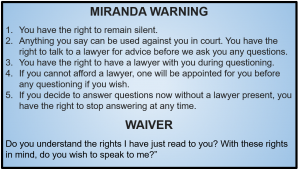
If you watch crime shows on TV or online, you’ve probably heard the phrase, “Read him his rights.” But what exactly are these rights, how can they protect you, and where did they originate? Let’s take a closer look.
What Are Your Miranda Rights?
By federal law, an arrestee must be informed of his or her rights before any interrogation or questioning may begin. The Miranda warning notifies you of the following rights:
- The right to remain silent. (And the warning that anything you say can and will be used against you in a court of law.)
- The right to speak to an attorney, and to have an attorney present during any questioning.
- The right to representation by an attorney, even if you cannot afford one.
So what does all this mean to you as a defendant? First, it means that while the police may detain and arrest you if they have “probable cause” to believe you committed a crime, you are not required to speak to the arresting officers or to respond to questions from a detective following your arrest. If you do waive your right to remain silent, the prosecution may use anything you say to build its case against you.
Second, you have the right to counsel—which means you can demand access to a lawyer before answering any questions from the police. If you do request counsel, the police may not question you unless that person is in the room at the time. And third, the Constitution provides that every defendant have access to representation, even if they cannot afford an attorney. So if you can’t afford a lawyer, the court will assign a public defender to your case at no cost to you.
How Do Your Miranda Rights Protect You?
Your Miranda rights serve as protection from both police abuse and self-incrimination. Just as the Fifth Amendment protects defendants testifying in court, Miranda protects defendants from aggressive interrogation by police. If you invoke your right to remain silent, for example, you may not be coerced into speaking about the circumstances of your arrest. Also, Miranda assures that you may have representation during questioning.
As your advocate, your lawyer has the expertise to advise you of what to say (and what not to say) during questioning. Working with an attorney can also help you if you need a quality bail bond company to help you post bail if needed. Miranda also ensures that you will not stand trial without representation simply because you cannot afford an attorney.
Where Did Miranda Rights Originate?
The Miranda law gets its name from a defendant named Ernesto Miranda, a California man who was arrested and charged with a series of felonies in the early 1960s. At the time, police were not required to inform arrestees of their rights, and law enforcement aggressively questioned Miranda to obtain a conviction. Miranda, through his attorney, later contended that he did not understand his rights at the time he was questioned. The case made its way to the Supreme Court, which ruled in a 1966 decision that a defendant must be informed of his or her rights prior to interrogation. Since the time of this ruling, law enforcement personnel nationwide have been required to inform all arrestees of their rights (in English or Spanish) before questioning.
At Bond James Bond, we are committed to providing professional and expert bail bond services to our clients. If a loved one has been arrested and charged with a crime, it’s in your best interest to secure their release on bond. We can work with you to explain the bond process works and can assist defendants in meeting their obligations to the court. Contact Bond James Bond today, and learn what we can do for you!
Bond, James Bond, Inc. can handle any size or type of Georgia bail bonds in Barrow County, Bartow County, Cherokee County, Clarke County, Cobb County, Floyd County, Gordon County, Gwinnett County, Paulding County and Polk County. We are always open - 24 hours a day, 7 days a week, including holidays. We have 11 locations that are conveniently located to serve you better.

